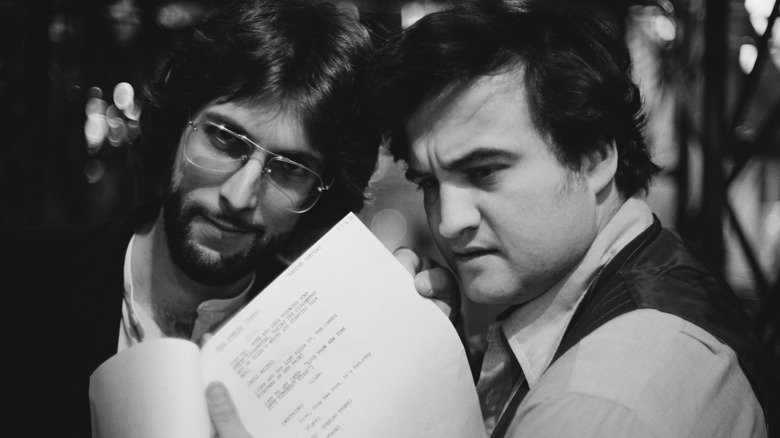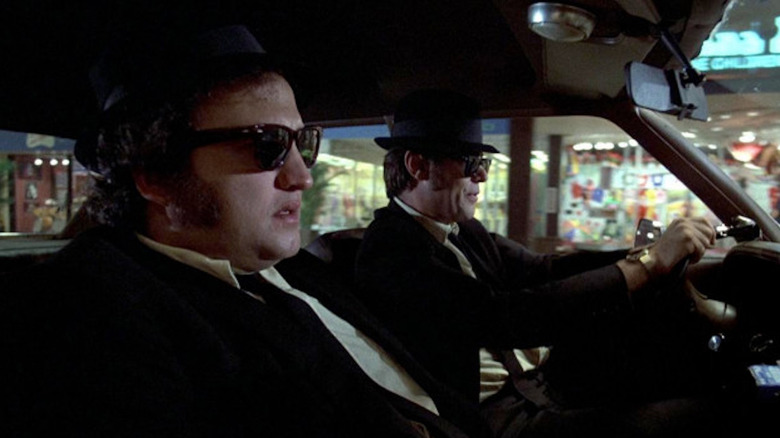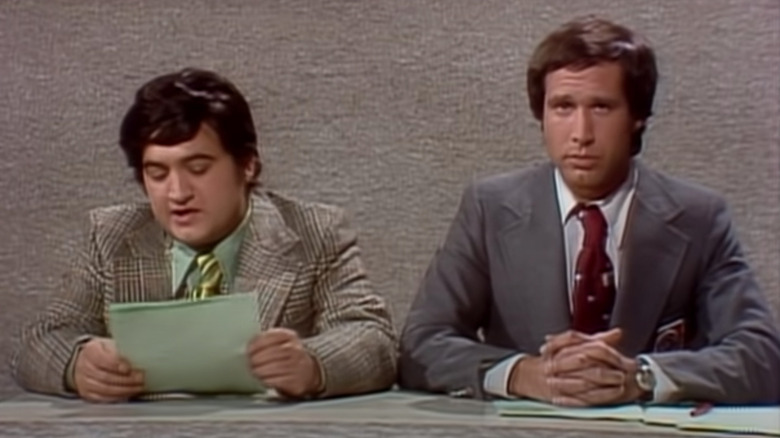Lorne Michaels Thought John Belushi Would Be A Nightmare For Saturday Night Live
John Belushi was a force of comedic nature. He made a name for himself in the early 1970s via his raucously hilarious bits in "National Lampoon's Lemmings," an Off-Broadway showcase for up-and-coming talents like Christopher Guest, Chevy Chase, and Tony Hendra. He also joined as a cast member of the "National Lampoon Radio Hour" alongside Gilda Radner, Bill Murray, and Harold Ramis. He slayed in the former when he broke out his hilariously spot-on parody of Joe Cocker, and seemed on the cusp of New York City theater stardom at the same time Lorne Michaels began assembling the cast for a wild swing of a variety show called "NBC's Saturday Night."
Michaels' vision appeared doomed at the outset. How was a show pitched at hip young folks going to find an audience in an 11:30 PM time slot, i.e. the exact hour most of these people were carousing at bars and parties? This was of no concern to burgeoning performers like Chase, Radner, and Dan Aykroyd, who were thrilled to be a part of something experimental on one of America's three major networks. Even if it failed, any exposure was good exposure.
Belushi didn't quite see it that way. He despised television. Though the medium was gaining respect in the 1970s via critically acclaimed series like "Columbo" and "The Mary Tyler Moore Show," television was still considered well beneath film and theater. Belushi, perhaps spoiled by the roaring laughter of "Lemmings" audiences, believed he was building to something bigger. Michaels took note of this, and crossed Belushi off his list.
What to do with a comedic genius who wants nothing to do with television?
According to Tom Shales and James Andrew Miller's "Live from New York: The Complete, Uncensored History of Saturday Night Live as Told by Its Stars, Writers, and Guests," John Belushi's friends and colleagues were lobbying Michaels to disregard Belushi's distaste for television and hire him anyway. He finally relented and called the actor in for an audition. According to Chevy Chase, Michaels was impressed. "[L]orne said, 'Well, he's funny, and we could use somebody who looks like him.'"
Michaels took everyone's enthusiasm for Belushi under advisement and leveled with the performer. "I told John, 'I hear what you're doing is great, but I don't want you to have to do something that you don't want to do.' My instinct was that he was going to be trouble."
Michaels also spied another bit of trouble on the horizon. As Aykroyd remembered:
"Lorne was concerned Belushi and I would be a duo that would give him a lot of trouble. He thought, 'Oh, get these guys together and their strength will be my weakness, because they'll be rebels.' And you know, in a way, he was right. Certainly there was an energy around us."
A bright, shining star determined to implode
As long as Belushi was game to be on television, Michaels was willing to roll the dice and put up with the mercurial genius' myriad of quirks and addictions. Though Chase was the series' first breakout star (on the strength of his affectless, stumblebum Gerald Ford impersonation and his arch "Weekend Update" persona), Belushi got the call to appear in the show's very first cold open: an absurdist bit in which Michael O'Donoghue's English teacher coaches Belushi's character through a number of nonsense phrases (e.g. "I would like to feed your fingers to the wolverines").
The rest was history, though it wasn't always easy for Michaels. Belushi was a relentless troublemaker. When his wife, Judith, kicked him out of the house for, her words, "this or that," he shacked up at Michaels' house. When Belushi fell asleep with a lit cigarette clenched in his fingers, he nearly burned the producer's house to the ground. According to Judith, "Lorne called me afterwards and said, 'Can I send him home now?'"
Belushi was an incorrigibly brilliant talent whose outsized appetite ultimately got the better of him. Had he reined in his demons, he could've been one of his generation's greatest actors. The not-knowing of this is so hard to take.


